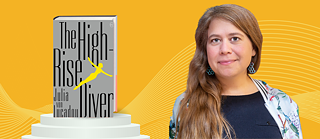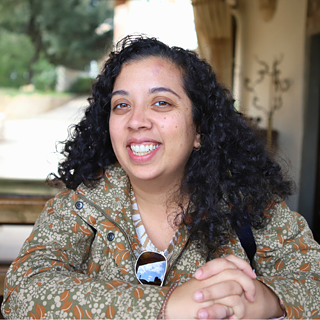Julia von Lucadou
The High-Rise Diver

In her debut novel The High-Rise Diver, German author Julia von Lucadou envisions a society where surveillance has become the norm, and an individual's worth is determined solely by their performance metrics, painting a thought-provoking portrait of a dystopian future.
By Prathap Nair
The fear of being surveilled by an unknown entity has preoccupied popular culture since the beginning of time. In some ways, with data surveillance at its peak, this near-dystopian world, imagined by George Orwell and Ursula K. Le Guin, is perhaps within reach. Some would argue that we are already living in a world where our movements are constantly monitored, and our perpetually online behaviour is rewarded.
German Writer Julia von Lucadou’s debut novel The High-Rise Diver imagines such a world where surveillance is normalized, and a person’s humanity is only as worthy as their performance metrics. In an unnamed megacity set somewhere in the future, the book’s protagonists Hitomi Yoshida and Riva Karnovsky straddle a system that has successfully eliminated humanism and reduced humans into performance machines.
You can read either it as a slick neo-expressionist novel with Black Mirror aesthetics or as a stark warning for a future of unfettered surveillance capitalism. Rendered in English by translator Sharmila Cohen in note-perfect prose, The High-Rise Diver is also a perfect entry point into post-modern German literature.
Julia on her book "The High-Rise Diver"
In this brief interview, Julia talks about her book and what it means to her.
Why did you decide to write your first book as a dystopian science fiction novel and who are your literary inspirations behind The High-Rise Diver?
Working in the film and television industry before I decided to become a writer, I experienced modern capitalist performance society and its effects on my own body and soul. My self-worth was completely dependent on my work performance, and I was willing to exploit myself to the max for a company that didn't care about my well-being. When I realized how unhealthy my attitude was, I wanted to investigate what drove me to think that way. Through researching and writing the novel, I started understanding myself and my colleagues better - and the role of modern-day society and its technologies in that experience. So for me, the dystopian novel is and has been a great medium to critically explore society and play through possible outcomes of our behaviour.
I've always admired novels like 1984 by George Orwell or The Handmaid's Tale by Margaret Atwood for their intelligent analysis and the entertaining, gripping way they set up the dystopian atmosphere.
Can you tell us the significance of reading your book in the current global political climate where state-sponsored surveillance is almost the norm?
The novel can be called dystopian or science fiction, but it is based on my experience of the world we live in. Almost all technology in the book already exists in some form or another. We all are used to carrying surveillance devices like our smartphones with us wherever we go and giving free access to our most private data. The data collected is already used to discriminate against and influence us - in some countries by authoritarian governments, in others by giant corporations or by other institutions of power like police, political parties, or medical insurance companies.
The near-future world, occupied by the book's main characters Riva and Hitomi, traps its subjects in a feedback loop of success and perfection. Read like that, the book is also a commentary on capitalism's never-ending quest for growth and success. Can you comment on that?
I think my own work experience taught me that excessive productivity and perfectionism are not set up to make us happy, even though that's the promise. The capitalist dream tells you: If you only work hard enough, you will be rich and happy. And that's a tempting promise. I bought into that promise because it was also tempting for me, and it caused me to work myself into burnout. We live in a world of immense competition with ourselves and our peers, exacerbated by all the measuring and comparison tools of success we have - like social media, activity trackers etc.
You have a doctorate in film studies. Did it help in constructing the sterile, constantly surveilled, near-future landscape in your book?
Definitely! The idea of telling the story mostly through the cold lens of a surveillance camera had its origin in my working in and with films. I also think and write very visually because of it. I love how visual storytelling is able to suck you deep into an atmosphere or emotion. And I tried to replicate that in my novel.
Can you give us a sense of the contemporary German literary landscape and where should one start as a non-German speaker with German books in English translation?
German contemporary literature - like all literature - is very varied. I’m personally interested in literature that engages with the world we live in. There are a lot of great German novels out there right now that deal with racism, gender politics, or climate change - like Olivia Wenzel and Kim de l’Horizon, just to name two. I am happy to be surrounded by such writers who are actively adding to important debates, making their readers think and emphasize their concerns.
Do you read fiction from the Indian literary landscape? If you do, tell us something you have read and enjoyed recently.
I must admit that I don't know enough - I've mostly read the "big names" like Salman Rushdie, Arundhati Roy, Vikram Seth, and Rohinton Mistry. That's why I am so excited to get to know the Indian literary landscape better during my visit! I'm very willing and happy to learn.

Julia von Lucadou’s precision of language was both a gift and a challenge. In part, it made my job significantly easier to be working with such a clearly written text – like having a perfectly focused photograph. At the same time, language played such a large role in building this futuristic dystopia and making it feel real, so it was extremely important to get it right. I would have to sit with certain words, change them several times, and feel them out until they hit the mark. I remember thinking: “This phrase has to sound futuristic, but also familiar and present, but also represent this dystopian and capitalist sense of progress.”
Literary translation is important. It doesn’t just have one role, but many: preserving language and culture, creating understanding, bringing forward marginalized voices, and encouraging the global melting pot, while simultaneously making visible the context of another culture. I often think about a translation as a bridge rather than a destination – you have to walk across to get there, but it also allows you to turn back to where you came from.
About the Author
